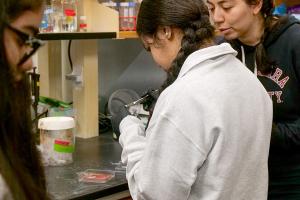Sameer Bajikar, Ph.D.

About
Sameer Bajikar, Ph.D., uses multidisciplinary techniques to study the biological processes that go awry in brain development in neurodevelopmental disorders, like autism spectrum disorders and intellectual disability. His group is developing novel human stem cell and genetically engineered mouse models to study a variety of neurodevelopmental disorders. By combining these models, high throughput molecular measurements, and computational systems biology, he hopes to identify key biological pathways that are involved in causing neurodevelopmental disorders. His lab will then use these biological pathways to engineer new treatments for this group of devastating disorders. He received both his undergraduate and graduate degrees in the department of Biomedical Engineering at the University of Virginia. His graduate work, under the mentorship of Dr. Kevin Janes, was supported by a Commonwealth Fellowship and Sture G. Olsson Fellowship from the University of Virginia and a National Science Foundation Graduate Research Fellowship. He then completed a postdoctoral fellowship in Molecular and Human Genetics under the mentorship of Dr. Huda Zoghbi at Baylor College Medicine. His postdoctoral fellowship was supported by an NRSA F32 fellowship from the National Institutes of Health / NICHD and a Zoghbi Scholar Award from Texas Children’s Hospital. As a Double ‘Hoo, Dr. Bajikar is excited to establish an exciting and vibrant research program in the Departments of Cell Biology and Biomedical Engineering at the University of Virginia starting in January 2024. The Bajikar lab is supported by an Independence Award from the International Rett Syndrome Foundation to study growth factor signaling in Rett syndrome, a several childhood neurological disorder. We are looking to recruit passionate and motivated students interested in understanding the underlying causes of neurodevelopmental disorders. Prospective trainees are encouraged to contact Dr. Bajikar at sbajikar@virginia.edu to learn about current opportunities.
Education
Baylor College of Medicine, Molecular and Human Genetics, Postdoc
University of Virginia, Biomedical Engineering, Ph.D.
University of Virginia, Biomedical Engineering, B.S.
We use multidisciplinary approaches from human stem cells to computational models to understand how brain function goes awry in neurodevelopmental disorders to engineer new therapies for these diseases.
Research Interests
Featured Grants & Projects

Research in Motion, UVA Health | School of Medicine
Understanding the mechanisms in childhood neurodevelopmental disorders

